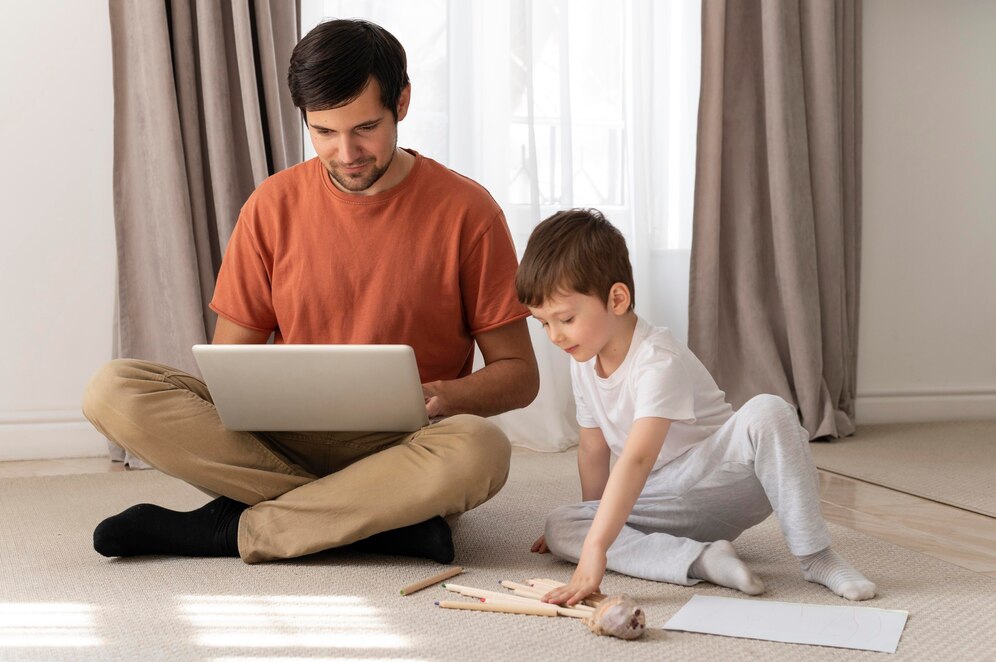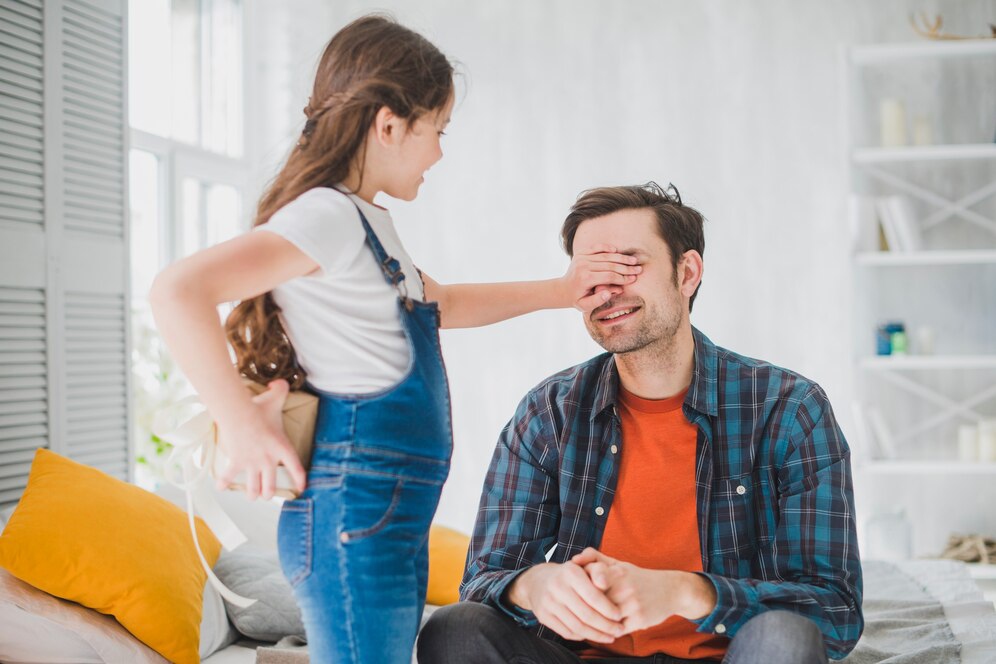
Age-Appropriate Ways to Discuss Body Changes
When the Questions Start Coming
“Why do I smell funny after running?” “What are these bumps on my face?” “Why is my voice squeaky?”
If these questions have started popping up in your home, you’re not alone. As children begin to notice changes in their bodies, their curiosity spikes — and as a parent, it’s your cue to step in.
But what if you’re not sure what to say? Or when to say it?
This guide will walk you through how to have an age-appropriate puberty talk, from preschoolers to preteens, without making it awkward or confusing.
You’ll learn:
- What to say (and when)
- How to explain puberty body changes clearly
- How to keep the conversation open and judgment-free
Let’s explore how to talk about growing bodies in a way that’s informed, respectful, and confidence-building for both of you.
Why These Conversations Matter
Silence Can Create Shame
Children are naturally curious about their bodies. When adults avoid or brush off their questions, it can send a subtle message that bodies — especially changing ones — are something to be embarrassed about.
When you talk openly and calmly about puberty, you:
- Normalise the changes
- Help your child develop body confidence
- Lay the foundation for healthy boundaries and self-care
When to Start Talking About Puberty
The Earlier, the Better (But Keep It Simple)
Experts recommend starting conversations about bodies and body changes around ages 3–5. At this age, you’re not diving into periods or erections — you’re simply teaching correct body part names and fostering body autonomy.
As your child grows, so can the depth of your conversations.
Here’s a quick age-by-age breakdown to guide you.
Age-Appropriate Puberty Talks: What to Say at Each Stage
Ages 3–5: Early Awareness
Goals:
- Teach proper body part names (e.g. penis, vulva, nipples)
- Set the tone that bodies are not shameful
- Reinforce the idea of privacy and body autonomy
Sample Phrases:
- “Everyone’s body is different and special.”
- “That’s called a vulva — it’s a private part.”
- “You’re in charge of your body. No one should touch it without your permission.”
Use picture books like “It’s Not the Stork” to explain these concepts in a child-friendly way.
Ages 6–8: Introducing Change
Goals:
- Start introducing the idea of body changes
- Talk about basic hygiene (deodorant, washing properly)
- Answer their questions as they come
Common Questions You Might Hear:
- “Why do I need deodorant now?”
- “Why does my older sister wear a bra?”
- “Why does my friend have a hairy lip?”
Sample Phrases:
- “As you grow, your body will change — that’s called puberty.”
- “Everyone starts changing at a different time — and that’s completely normal.”
Consider reading together: “What’s Happening to Me?” (Usborne)
Ages 9–11: Deepening the Conversation
This is when puberty body changes often begin, and children need real, accurate answers.
Topics to Cover:
- Hair growth (pubic, underarms, facial)
- Growth spurts and weight changes
- Periods and erections
- Body odour and sweat glands
- Skin changes (acne, oiliness)
Sample Phrases:
- “You might start growing hair in new places like your armpits — that’s your body’s way of growing up.”
- “Periods are your body’s monthly way of preparing to have babies someday — but right now, it’s just part of being healthy.”
Introduce a puberty care kit with:
- Deodorant
- Mild face wash
- Pads or pantyliners (for girls)
- A private journal
Ages 12+: Advanced Puberty Support
At this age, most children are already experiencing changes and may also be:
- Comparing themselves to peers
- Developing body image issues
- Struggling with confidence or anxiety
Add Topics Like:
- Voice changes and growth spurts
- First period and managing menstruation
- Nocturnal emissions (“wet dreams”)
- Managing emotions and mood swings
- Social pressures and self-esteem
Sample Phrases:
- “Having a wet dream doesn’t mean anything is wrong. It’s just your body practising what it knows how to do.”
- “You might notice pimples or greasy skin — that’s common and there are ways to care for it.”
Encourage personal grooming as self-care, not as a way to “fix” their appearance.
Practical Tips for Talking Puberty With Confidence

1. Normalise Variation
Emphasise that no two people hit puberty at the same time:
- Some grow tall early, others late
- Some get acne, others don’t
- All of it is okay
This helps reduce peer comparison and shame.
2. Use Books and Resources as Tools
Give your child access to books they can browse privately and revisit when they’re ready.
3. Choose Low-Pressure Moments
Some of the best puberty talks happen when:
- You’re driving somewhere
- Shopping for toiletries
- Watching a film or TV scene involving teen characters
The key is to avoid the dreaded “sit-down talk” — unless they request it!
4. Encourage Questions Without Judgement
Say:
- “You can ask me anything, anytime.”
- “That’s a really smart question — I’m glad you asked.”
If you don’t know something, be honest and look it up together.
Real Parent Experiences (Anecdotes)
“The Deodorant Moment”
“My son came home from football and asked why his friends said he ‘stank’. I realised I’d missed the chance to talk about body odour. We went shopping that evening and picked out deodorant together. He still remembers it as a proud milestone.”
“First Bra, No Big Deal”
“When my daughter’s breast buds started forming, she was mortified. I casually added soft crop tops to her drawer without making a fuss. She wore them the next day. No awkward conversation needed — just quiet support.”
How to Handle Resistance or Embarrassment
It’s normal for children (especially preteens) to:
- Roll their eyes
- Say, “I already know this.”
- Want privacy
That doesn’t mean they’re not listening.
- Keep it short and light
- Leave a book or leaflet
- Return to the topic later
- Praise their maturity when they do engage
What Not to Do
- Don’t use baby talk or euphemisms
- Use proper terms like vulva, penis, period
- Don’t shame or joke about body changes
- Treat changes as natural, healthy, and empowering
- Don’t wait for them to come to you
- Take the lead, gently and regularly
Conclusion: One Conversation Can Build Lifelong Confidence

Talking about puberty body changes doesn’t need to be daunting or awkward. In fact, with the right tone and timing, it can be one of the most empowering experiences your child has with you.
Here’s what to remember:
- Start early, talk often
- Tailor your language to their age and maturity
- Keep things relaxed, factual, and empathetic
- Equip them with tools and support — both emotional and practical
You’re not just educating them about puberty. You’re showing them it’s okay to talk about life’s biggest changes — openly and without fear.
Your Turn
How have you started puberty talks with your child Share your experiences, tips, or questions in the comments. Subscribe for practical parenting guides and puberty resources. Know someone dreading “the talk”? Send this article their way.


